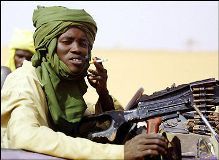Mediators increase pressure on rival Darfur rebels to make deal
Feb 3, 2006 (ABUJA) — International mediators are increasing pressure on fractious rebel groups from Sudan’s Darfur region to strike a peace deal with the government, delegates at talks in Nigeria said on Friday.
 Rival rebel factions whose arguments hampered six previous rounds of talks have negotiated jointly during the current round, but new signs of disunity have come out into the open and mediators are trying to stop that.
Rival rebel factions whose arguments hampered six previous rounds of talks have negotiated jointly during the current round, but new signs of disunity have come out into the open and mediators are trying to stop that.
“We cannot continue to negotiate forever. Divisions in the (rebel) movements complicate the whole process and we are trying to bring the factions closer together,” said Noureddine Mezni, spokesman for the African Union (AU) mediation team.
The AU, which has about 7,000 peacekeepers in Darfur where violence is escalating, says it is hopeful a peace deal will be reached but it is sending increasingly strong signals that its patience with the Abuja negotiators is limited.
AU special envoy for the Darfur conflict, Salim Ahmed Salim, told the U.N. Security Council on Jan. 13 it should consider “carefully targeted sanctions” against those who delay progress towards a settlement.
Delegates from the two rebel movements, the Sudan Liberation Army (SLA) and the smaller Justice and Equality Movement (JEM), said they felt a peace deal could be achieved. However, rival factions accused each other of undermining the talks.
The SLA and the JEM took up arms in early 2003 over what they describe as marginalisation by Khartoum. The government backed proxy militias to fight the rebels and the conflict has killed tens of thousands of people and driven more than 2 million from their homes.
FRUSTRATION
The two factions of the SLA and the JEM have adopted a unified negotiating position on the three key areas of power-sharing, wealth-sharing and security arrangements. But under the surface they have manoeuvred against each other and progress has been “frustratingly low” according to the AU.
The African body will run out of funds for its Darfur mission in March, and the United States is spearheading efforts to set up a U.N. force that would take over.
Delegates at the talks said this afforded an opportunity to speed up the process because the Sudanese government preferred to deal with the AU and would therefore be disposed to compromise while the African body was still in charge.
The top U.N. envoy in Sudan, Jan Pronk, was due to arrive at the Abuja talks on Friday for a visit that delegates said would add to the pressure to speed up the process.
The AU urged the leaders of all the parties to hurry to Abuja to personally take charge of their delegations during what it called “this crucial phase of the negotiations”.
The call was aimed mainly at Minni Arcua Minnawi, head of one of the factions of the SLA, and Khalil Ibrahim, leader of the JEM, neither of whom are in Abuja now.
One novelty that raised tensions within rebel ranks was an alliance announced on Jan. 20 between Minni and Khalil, both from the Zaghawa ethnic group. This further isolated Abdelwahid Mohamed al-Nur, an ethnic Fur who leads a rival SLA faction.
Two ethnic Arab delegates of the JEM who voiced their opposition to the alliance, complaining that it was ethnically motivated, were beaten up in their Abuja hotel room last Saturday by other JEM delegates. The AU immediately expelled the attackers from the talks.
(Reuters)
